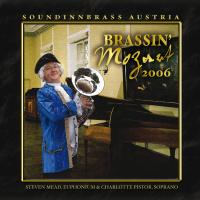Brassin' Mozart 2006 review by Peter Bale
Peter Bale, www.4barsrest.com
Of all the various celebrations planned to mark the 250th anniversary of the birth of Wolfgang Amadeus Mozart, this latest release by Steven Mead may prove to be one of the most unusual, featuring as it does an instrument that did not come on the scene until well after he had left this mortal sphere.
In preparing his tribute, which has been planned in conjunction with a series of concert performances, Steven both looks back, with fresh arrangements of Mozart's music, and also forward, with two new compositions by up and coming composer Peter Meechan, taking his inspiration from the master. If he is able to listen to this recording, with its stylish playing and brilliant technical skill, I'm sure Mozart would give it his seal of approval - after all, this is the man who rearranged the Messiah, giving the trumpet obligato in "The trumpet shall sound" to a clarinet!
In a recent article in British Bandsman, Peter Meechan referred to the relatively small number of successful brass arrangements and performances of Mozart. This is music full of subtlety which needs to be approached sensitively if it is to come off effectively. The players of Sound-Inn-Brass (4 trumpets of various sizes, 2 French horns, 4 trombones, tuba & percussion), coming predominantly from the Inn/Upper Austrian regions, are clearly steeped in the traditions of playing Mozart, and this is apparent from the opening bars of the "Overture to Marriage of Figaro". The sense of fun is there from the start, with clean articulation and a solid sound, topped off with the brightness of the piccolo trumpet, who does on occasion sound a little isolated from the rest. Crescendi are well-judged, with accents carefully placed, but not exploding like musket shots as can sometimes be the case when a brass band tackles a Mozart overture.
The first of Steven's solo items, here titled "Theme and variations from Andantino con Variazione" is based on the third movement of the "Sinfonia Concertante K.297B". Originally written for four soloists - oboe, clarinet, horn and bassoon - scholars are divided as to whether it is in fact by Mozart.
Whatever the case may be, it certainly makes for an effective solo vehicle in this version by Maurice Bale which, with apologies to Mr Eric Morecambe, uses ". . . the right notes, but not necessarily in the right order"! Maurice has changed the order of some of the variations and selected from the various solo lines to produce a technical tour de force which is nevertheless playable, at least in the hands of a player of Steven's skills. As with a number of Mozart's wind ensemble pieces, it is apparent that his oboist was a particularly fine player, able to cope with rapid figurations and wide intervals, but Steven makes light of the difficulties, although even he seems to be fighting for breath at times. With some of the roulades, the upward runs are so smooth you would think it is a French horn playing, rather than euphonium.
Joining Steven and Sound-Inn-Brass in this project is Charlotte Pistor, an American soprano who lives and performs in Salzburg. Her first item is an aria from "Zaide", an unfinished dramatic work dating from 1779. The work may be generally forgotten, but the aria "Rest gently my sweet life" is a gem, and she receives sympathetic support from the ensemble, under the direction of Howard Evans, continuing the collaboration with Steven from "Locomotion", where Howard conducted his own band from Boscombe.
Mozart's "Bassoon Concerto" is a staple part of every bassoonist's repertoire, combining attractive melodies with ample opportunity for technical display. The "Allegro" first movement has frequently been featured as a euphonium solo with band accompaniment, but here Steven plays the work complete, featuring some elegant trills in the central "Andante ma adagio", and a couple of wide-ranging cadenzas, written by Steve but sounding quite idiomatic. It is good to have all three movements, each with its own challenges, but ultimately sounding as if the concerto may have always been intended to be played on euphonium.
The second vocal item is the popular "Hallelujah" from "Exultate Jubilate", frequently played on trumpet or cornet, but sounding all the more effective in its vocal form, although not sung, as originally intended, by a castrato! The solo line flows more smoothly than is sometimes the case, and is matched by some delicate trumpet and horn playing.
The "Overture - The Impressario" once was a popular item on brass and military band programmes, and it comes up fresh in this arrangement by Hubert Gurtner. The ensemble is particularly finely balanced, with answering phrases well matched and a general lightness of tone.
In the duet "Sub tuum praesidium", an offertory hymn to the Virgin Mary, Steven takes the part of the tenor soloist, effectively adding a little more vibrato to blend with Charlotte's soprano. This is another work whose provenance is disputed, some believing it to be the work of Michael Haydn, but that should not be allowed to detract from ones enjoyment of such good music. Initially, the duettists appear alternately, but when they do join together the voice and euphonium complement each other very well.
Peter Meechan's first contribution, "Requiem Paraphrases on a Theme of Mozart", is a major work drawing its musical material from the opening bars of Mozart's "Requiem". Rather than producing a pastiche or parody, however, the composer has constructed a work in his own attractive if uncompromising style. Following a declamatory statement by the soloist, there follows a passage accompanied by the low brass setting out the original theme, with the solo line becoming gradually more elaborate, and moving into the top register.
A short tutti section with some lush jazz-influenced chords is followed by an ostinato-like passage where various instruments interact with soloist, including a prominent part for marimba, leading up to the demanding cadenza, covering the full range of the instrument, with some ferocious leaps. A brief recapitulation leads to a spectacular if somewhat abrupt conclusion. It is clear that the composer has an affinity with the euphonium, and has produced another major contribution to the euphonium solo repertoire to follow on from his "Three stories - Three worlds", written for David Thornton.
For the "Adagio from the Clarinet Concerto" Steven has chosen to play without vibrato, and at a very slow tempo. The effect is certainly very different and on the whole successful, once one has adjusted to the sound. It is a fine demonstration of sustained, legato playing, carefully phrased and again with exemplary accompaniment, keeping beneath the soloist at all times. The runs are never rushed, and simply fall into place quite naturally, the restrained approach making it seem deceptively easy!
The final item is Peter Meechan's "Moz" - quite a different kettle of fish to the "Requiem Paraphrases", more of a romp through various snippets of Mozart, including "The Magic Flute", "Eine kleine Nachtmusik" and the "Rondo from Horn Concerto No 4", although I think Michael Flanders would be hard-pressed to sing along with this version, with its abrupt changes of key! Despite the technical obstacles which have to be overcome, the players bring a real sense of fun, ending the recording on a high.
The presentation is first class, with gate-fold cardboard packaging and full notes in both English and German, covering both the music and the artists taking part. As was said earlier, the key to playing Mozart is to get the style right, and this, together with the excellent teamwork between soloists and accompaniment, marks this recording out. With the inclusion of the two new pieces in homage to the master this is a fitting tribute, not only a worthy contribution to the anniversary celebrations but also a very enjoyable hour's music-making.
Peter Bale

Steven Mead with Sound Inn Brass (Austria) and Charlotte Pistor, cond. Howard Evans
An album of brand new Mozart arrangements, a two original compositions, to celebrate the 250th anniversary of the birth of W.A.Mozart

